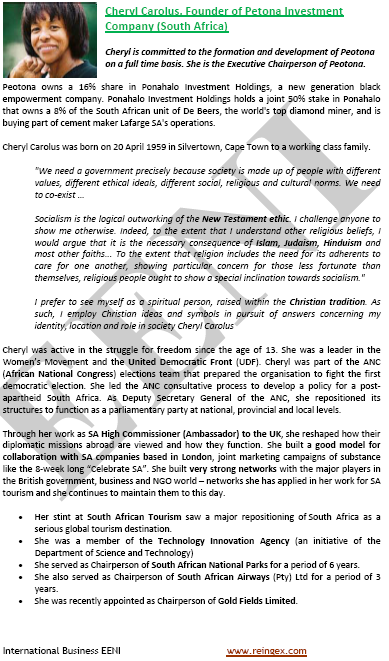Business in South Africa (BRICS)

Foreign Trade and Business in South Africa, Johannesburg. South African Businessman. Patrice Motsepe
- Introduction to South Africa (Southern Africa)
- H.E. Nkosazana Dlamini-Zuma (former Chairperson of the African Union)
- Desmond Tutu
- South African Economy
- Economic Profile of the South African provinces
- Foreign Trade of South Africa
- Economic relationships with Africa, Asia, Europe, and America
- BRICS Countries
- Business and investing opportunities in South Africa
- Investment in South Africa
- Case Study
- South African Automotive Industry
- State-owned enterprises
- BPO
- Shoprite (African largest food retailer)
- Off-shoring
- Access to the South African Market
- Business Plan for South Africa
South African Businessman.
- Patrice Motsepe
- Cheryl Carolus
- Bridgette Radebe
- Rapelang Rabana
- Wendy Appelbaum
- Irene Charnley
- Cyril Ramaphosa
The aims of the subject “Foreign Trade and Business in South Africa” are the following:
- To analyze the South African Economy and Global Trade
- To know the business opportunities in South Africa
- To explore the South African trade relations with the country of the student
- To know the South African Trade Agreements
- To examine the profile of the South African Businessman
- To develop a business plan for the South African Market

The Subject “Foreign Trade and Business in South Africa” belongs to the following Online Programs taught by EENI Global Business School:
Masters: Business in Africa, International Business, Foreign Trade.
Doctorate: African Business, World Trade.
Course: Business in Southern Africa.
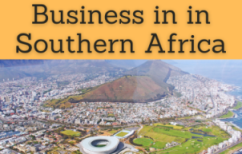
Languages:  or
or  Afrique du
Sud
Afrique du
Sud  Africa do
Sul
Africa do
Sul  Sudáfrica.
Sudáfrica.
- Credits of the subject “Doing Business in South Africa”: 3

- Duration: three weeks

Masters adapted to the  South African Students.
South African Students.
International Trade and Business in South Africa.
The Republic of South Africa is the second-largest African economy and a BRICS country.
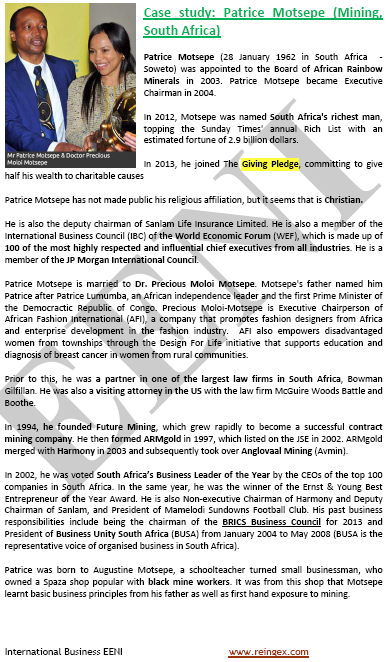

- South African Ports (Durban, Richards Bay, Port Elizabeth, Cape Town)
- Trans-African corridors:


South African Preferential Access and Trade Agreements:
- South Africa and the Southern African Economic Area
- Southern African Development Community (SADC)
- EU-SADC Agreement
- COMESA-EAC-SADC Agreement
- Southern African Customs Union (SACU)
- India-SACU Agreement
- EFTA-SACU Agreement
- UK-SACU and Mozambique Economic Partnership Agreement
- MERCOSUR-SACU Preferential Trade Agreement
- African Continental Free-Trade Area
- Indian-Ocean Rim Association
- AGOA Africa-United States
- Trade Agreements with Cameroon and Malawi
- EU-South Africa Agreement
- BRICS Countries

- WTO
- Agreement on Sanitary and Phytosanitary Measures
- GATS
- Agreement on Technical Barriers to Trade
- Agreement on Preshipment Inspection
- Agreement on Safeguards
- Trade Facilitation Agreement
- WCO
- Convention Harmonization of Frontier Controls of Goods
- BIC
- Chicago Convention (ICAO)
- IMO
- Convention for Safe Containers
- Istanbul Convention
- Customs Convention on Containers - not a member
- Single African Air Transport Market (SAATM / IATA)
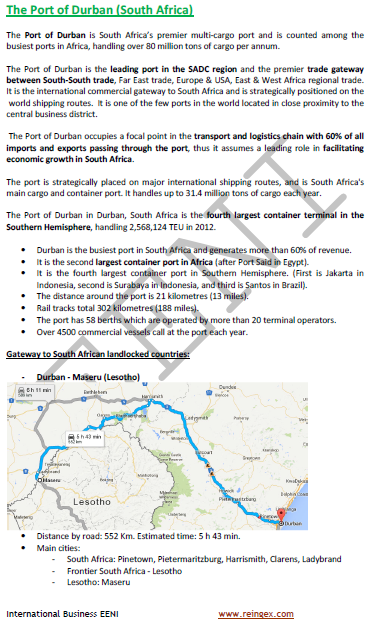

- Economic Commission for Africa
- African Union
- African Development Bank
- Africa-Asia Partnership
- Africa-Korea Partnership
- Africa-India Cooperation
- Africa-BRICS
- BADEA
- Africa-Japan Cooperation
- Africa-South America Summit
- Forum on China-Africa Cooperation

- WB
- WTO
- UN
- IMF
- OECD (Key Partner)
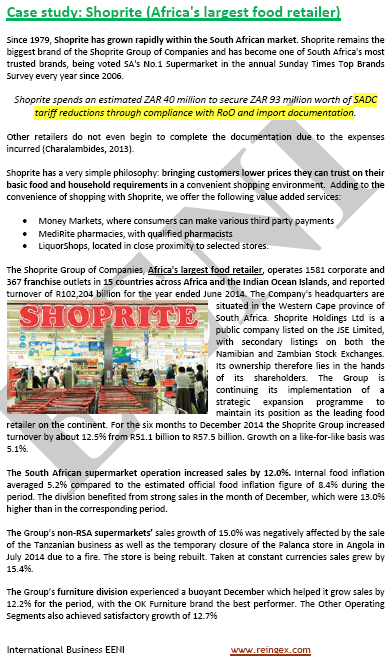
- South Africa has a population of 55 million people.
- 79% are classified as African, 9.6% as Whites, 8.9% as colored, and 2.5% are people from India and Asia
- Area of South Africa: 1,221,037 km²
- South African Capital: Pretoria (Executive power), Bloemfontein (judicial power), and Cape Town (legislative)
- Johannesburg is the largest city in South Africa (957,441 people)
- Largest cities: Johannesburg, Pretoria, Cape Town, Bloemfontein, Durban and Ekurhuleni
- Borders of South Africa: Namibia, Botswana, Zimbabwe, Mozambique, Eswatini, and Lesotho
- Official languages of South Africa (11): Afrikaans, English, isiNdebele, isiXhosa, isiZulu, Sesotho sa Leboa, Sesotho, Setswana, siSwati, Tshivenda, and Xitsonga
More information about South Africa (EENI African Business Portal).
Main religions in South Africa:
- Almost 80% of the South African people are Christians
- Catholicism
- Protestants (30 million, 68% of the population, Methodists: 4 million)
- Anglicans
- African Traditional Religions

South Africa belongs to the Southern African Economic Area.
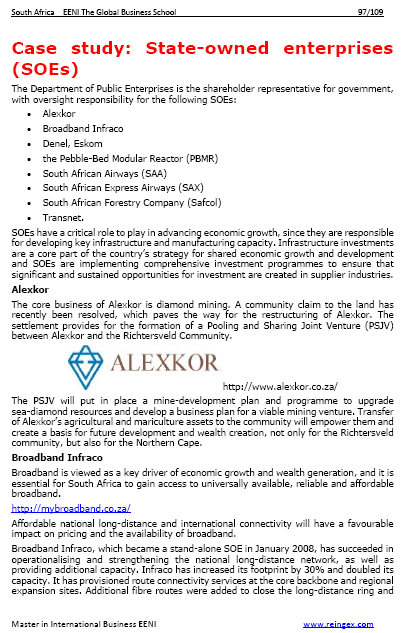

South Africa: The economic growth engine in the Southern Africa region.
- South Africa is one of the most promising emerging markets (BRICS countries), and the second African Economy after Nigeria
- Not only South Africa is a significant emerging economy, but is also the gateway to the other Southern African Markets
- South Africa is a highly developed country with good infrastructures and a good climate for the foreign direct investment
- There are significant business opportunities in South Africa
- South Africa is one of the BRICS Countries (Brazil, India, and South Africa)
- The Republic of South Africa is the second economic powerhouse of Africa
- The economy of South Africa has been growing since September 1999
- South Africa is leading the industrial production, mineral production and electricity in Africa
South Africa is the first African car-maker (76% of the total African production).
- The Business Process Outsourcing is one of the fastest growing economic sectors in South Africa. The Call centre industry employs 54 000 call centre agents
- The South African manufacturing sector is the most developed in Africa
- The Motor vehicle industry in South Africa accounts for 10% of the manufacturing exports
- State-owned companies have a critical function in the economy
- The South Africa Stock Exchange ranks among the top 20 in the World
- Legal Framework of South Africa is well-developed
- The Republic of South Africa has a modern and efficient infrastructure
- Many multinational companies are established in the country to export products and services to the Southern African region
- The Black Economic Empowerment is a policy instrument intended at broadening the economic base of South Africa, further stimulating the economic growth and creating jobs while eradicating the poverty
- The United States is the largest trading partner of South Africa (is a beneficiary of AGOA)
The largest South African Ports:
- Port of Durban
- Richards Bay
- Port of East London
- Ngqura
- Port Elizabeth
- Mossel Bay
- Cape Town
- Saldanha
Nearest foreign ports:
- Via Trans-Orange Corridor: Northern Cape, Upington
- Via Trans-Kalahari Corridor: Gauteng, Johannesburg, and Pretoria
The Port of Maputo (Mozambique) is located to 120 kilometers of the frontier. Access to Limpopo, Gauteng, and Mpumalanga (Maputo Development Corridor), Johannesburg, and Pretoria.
